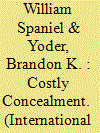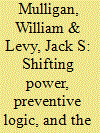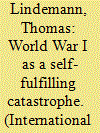|
|
|
Sort Order |
|
|
|
Items / Page
|
|
|
|
|
|
|
| Srl | Item |
| 1 |
ID:
188388


|
|
|
|
|
| Summary/Abstract |
This article presents a formal model that shows how states can credibly reassure each other simply by maintaining a cooperative outward narrative. The reassurance literature to date has focused largely on costly signaling, whereby benign states must distinguish themselves by taking specific actions that hostile types would not. The mere lack of overtly expressed hostility without costly signals has been considered “cheap talk,” on the assumption that this behavior is costless for hostile states and thus uninformative. In contrast, this paper argues that maintaining a cooperative façade while secretly formulating and executing exploitative policies carries inherent trade-offs, and thus constitutes a credible reassurance signal. Foreign policy planning and implementation requires communication among various individuals, groups, and organizations, which has some probability of being observed and punished by outside actors. Yet efforts to conceal the policymaking process and reduce this probability are costly—they require investments in internal monitoring and restrictions on internal communication that can substantially degrade policy outcomes. Thus, to the extent that a state's foreign policymaking process is transparent—that is, that concealing internal communications is difficult—the absence of positive signals of hostility is a credible signal of its benign intentions. The argument is illustrated with a case study of German reassurance signals during the July Crisis preceding World War I.
|
|
|
|
|
|
|
|
|
|
|
|
|
|
|
|
| 2 |
ID:
131342


|
|
|
|
|
| Publication |
2014.
|
| Summary/Abstract |
Most theories of war and peace in the modern world, whether they acknowledge it or not, emerge from three historical questions. Why did the First World War break out? Was Hitler's Germany - and its murderous campaign of domination and destruction - unique? And how do nuclear weapons affect international relations? Coming first and producing a seemingly inexhaustible inheritance that vexes geopolitics to this day (think Syria), no international relations scholar can avoid wrestling with the causes of what was once called the Great War.
|
|
|
|
|
|
|
|
|
|
|
|
|
|
|
|
| 3 |
ID:
153326


|
|
|
|
|
| Summary/Abstract |
If a declining state has incentives for preventive war, the rising state should have incentives to delay a confrontation until it is stronger. We develop the theoretical paradox and examine the July 1914 crisis. Why did Russia, rising relative to Germany, not adopt a buying-time strategy? We argue that although most Russian leaders hoped to avoid a confrontation, they feared that the failure to support Serbia would lead to a loss of Russian credibility and a significant setback to Russia’s position in the Balkans, one that could not easily be reversed, even with Russia’s expected increase in relative military power.
|
|
|
|
|
|
|
|
|
|
|
|
|
|
|
|
| 4 |
ID:
132924


|
|
|
|
|
| Publication |
2014.
|
| Summary/Abstract |
It is a quite common conviction in international relations (IR) theory that what George Kennan called the 'original catastrophe' was predetermined and unavoidable. These explanations of World War I consider the conflict primarily as an inevitable by-product of material structures.1 On the one hand, are those who emphasize the impact of international system's constraints on state behavior - rigid alliances, bipolarization between great powers, the arms race, rivalry dynamics and so on.2 Yet, others regard countries' domestic structures as fundamental component in the outbreak of a diversionary war.3 If taken too far, these approaches can imply that the war was both rational and inevitable in that it was the logical consequence of internal and external tensions. Most importantly, these perspectives fail to take into account leaders' corresponding representations and narratives of 'material' reality and their role on the decision-making process. This essay devotes special attention to the hitherto neglected narrative dimension of World War I.4 In the following, I will propose a new interpretation for German brinkmanship during the July crisis.
|
|
|
|
|
|
|
|
|
|
|
|
|
|
|
|
|
|
|
|
|